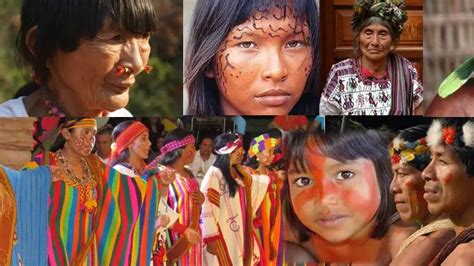Indigenous peoples, also known as Indigenas, are the descendants of the original inhabitants of Latin America. They have a rich cultural heritage that has been passed down through generations. Indigenas have their own languages, traditions, and beliefs, and they have played an important role in the history of the region.

The Indigenous Population of Latin America
There are an estimated 400 indigenous groups in Latin America, with a total population of over 40 million people. They make up a significant portion of the population in many countries, including Bolivia, Guatemala, and Peru.
Indigenous Languages
Indigenous peoples speak a wide variety of languages. The most common indigenous language in Latin America is Quechua, which is spoken by over 10 million people in the Andes region. Other major indigenous languages include Aymara, Guarani, and Nahuatl.
Indigenous Traditions
Indigenous peoples have their own unique traditions and customs. These traditions include traditional music, dance, and art. Indigenous peoples also have their own systems of medicine and agriculture.
Indigenous Beliefs
Indigenous peoples have their own beliefs about the world and the afterlife. Many indigenous peoples believe in a supreme being, and they have their own rituals and ceremonies to honor their gods and ancestors.
The History of Indigenas
Indigenous peoples have lived in Latin America for thousands of years. They were the first inhabitants of the region, and they played a major role in the development of its cultures and civilizations. However, the arrival of European colonizers in the 15th century had a devastating impact on indigenous peoples. They were enslaved, displaced from their lands, and forced to convert to Christianity.
The Indigenous Rights Movement
In the 20th century, indigenous peoples began to organize and fight for their rights. They demanded the recognition of their land rights, their cultural rights, and their right to self-determination. The indigenous rights movement has made significant progress in recent years, and indigenous peoples have achieved important victories in many countries.
The Challenges Facing Indigenas
Despite the progress that has been made, indigenous peoples continue to face many challenges. They are often marginalized and discriminated against, and they have difficulty accessing basic services such as education and health care. Indigenous peoples are also disproportionately affected by poverty and environmental degradation.
The Future of Indigenas
The future of indigenous peoples in Latin America is uncertain. However, indigenous peoples are determined to continue fighting for their rights and their way of life. They are working to preserve their languages, traditions, and beliefs, and they are demanding the recognition of their rights by governments and international organizations.
There are a number of common mistakes that can be made when working with indigenous peoples. These mistakes can lead to misunderstandings, conflict, and resentment. Here are some common mistakes to avoid:
- Assuming that all indigenous peoples are the same. Indigenous peoples are a diverse group of people with different cultures, languages, and traditions. It is important to respect the diversity of indigenous peoples and to approach them with an open mind.
- Ignoring the history of indigenous peoples. Indigenous peoples have a long and complex history that has shaped their present-day situation. It is important to understand this history in order to understand the challenges that indigenous peoples face today.
- Stereotyping indigenous peoples. Indigenous peoples are often stereotyped as being poor, uneducated, and backward. These stereotypes are inaccurate and harmful. Indigenous peoples are just as capable and intelligent as any other group of people.
- Treating indigenous peoples as a homogeneous group. Indigenous peoples are not a monolithic group. They have different cultures, languages, traditions, and beliefs. It is important to recognize the diversity of indigenous peoples and to approach them with respect for their individual identities.
- Imposing Western values on indigenous peoples. Indigenous peoples have their own unique values and beliefs. It is important to respect these values and beliefs and to avoid imposing Western values on indigenous peoples.
There are a number of effective strategies for working with indigenous peoples. These strategies can help to build trust, understanding, and mutual respect. Here are some effective strategies for working with indigenous peoples:
- Engage with indigenous peoples in a respectful and culturally sensitive manner.
- Listen to indigenous peoples and learn about their culture, history, and values.
- Respect indigenous peoples’ right to self-determination.
- Support indigenous peoples’ efforts to preserve their languages, traditions, and beliefs.
- Work with indigenous peoples to develop programs and policies that address their needs.
- Advocate for the rights of indigenous peoples at the local, national, and international levels.
Indigenous peoples are an important part of Latin American society. They have a rich cultural heritage and they have played a major role in the history of the region. However, indigenous peoples continue to face many challenges, including marginalization, discrimination, and poverty. It is important to work with indigenous peoples in a respectful and culturally sensitive manner in order to build trust, understanding, and mutual respect. By working together, we can build a more just and equitable future for indigenous peoples and for all.
